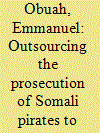| Srl | Item |
| 1 |
ID:
117646


|
|
|
|
|
| Publication |
2012.
|
| Summary/Abstract |
There has been a failure by the international community to establish an effective system of prosecution for the trial of captured Somali pirates. This failure is in part due to the inability of the United States and by developed countries in Europe to carry out their responsibility as prescribed under international laws dealing with the prosecution of captured pirates. Owing to domestic political pressures, it has become politically expedient to outsource the trial of captured Somali pirates to Kenya and other developing countries in the East African region. By the end of 2009, Kenya had signed six memoranda of understanding with Canada, China, Demark, the United Kingdom, the United States and the European Union. Kenya has become the single largest destination for the trial of captured Somali pirates whose victims are not Kenyans; the attacked vessels do not fly the Kenyan flag, the attacked ships are not managed by Kenyans and the crimes did not occur in Kenya's territorial waters. Outsourcing as constructed, conceived and implemented at present is morally and legally wrong. It has left a weak and poor country to shoulder the responsibility of the international community. This paper examines the reasons for outsourcing and its implications for Kenya.
|
|
|
|
|
|
|
|
|
|
|
|
|
|
|
|
| 2 |
ID:
186144


|
|
|
|
|
| Summary/Abstract |
The United Nations Convention on Law of the Sea regime makes it incumbent upon the capturing state to effectively prosecute the apprehended pirates as per their domestic laws. Many states, including India, have not developed piracy-related domestic legislation; therefore, the domestic courts face various substantive and procedural challenges during trial. Indian judiciary relies on various criminal law statues to prosecute maritime pirates, none of which defines piracy as a crime in India. The Indian government has recently introduced the Anti-Maritime Piracy Bill, 2019. This paper seeks to examine the prosecution of maritime pirates in India and identify the existing gaps within the legal framework. Further, this paper discusses the Anti-Maritime Piracy Bill, 2019 in detail to determine if it can achieve effective prosecution of maritime pirates by filling in the gaps of the current Indian criminal law regime.
|
|
|
|
|
|
|
|
|
|
|
|
|
|
|
|